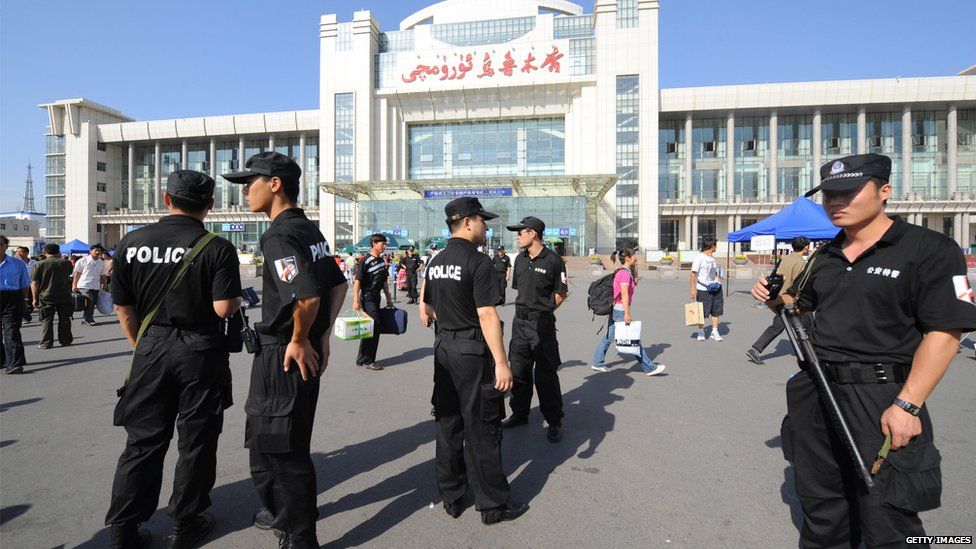China Week: Security in a fast food nation
- Published

From government regulation to waistlines, there's been plenty of expansion in China this week.
But also one significant shrinkage blamed on "reckless" humans.
The definition of national security
Legislation passed on Wednesday has broadened China's take on security to include Communist Party rule as well as outer space, the internet, the ocean deep and polar regions.
An official at the National People's Congress said that "China's national security situation has become increasingly severe" and the country would not "leave any room for disputes, compromises or interference" in protecting "core interests".
In the past, core interests have been understood to refer to Taiwan, Tibet and Xinjiang.
What exactly constitute "core interests" now is left unclear in this legislation, as is much else.
The only thing to be clear about is that the definition of "security" has gotten wider, deeper, higher and more pervasive.
Also clear is that this is all on the initiative of President Xi Jinping himself.
A runway on Fiery Cross Reef
In little over a year, dredgers have turned a lump of coral into an island with a 3km airstrip (9840ft) that China's neighbours fear could help Beijing enforce a claim to airspace over the South China Sea.
Analysts at the Washington-based Asia Maritime Transparency Initiative said the latest satellite imagery showed the runway on Fiery Cross Reef being paved and marked.
One American commander even called China's reclamation programme in the region "a great wall of sand".
This week, the Chinese government said the reclamation project was now complete and "facility building" was the next stage.
China's citizens
Chinese people are getting taller and heavier with rural children showing the most significant growth.
Between 2002 and 2012 rural boys had, on average, grown 4.1cm taller and nearly 5kg heavier.
Rural girls and urban children grew too.
On the same day the report came out, I took a flight from Beijing to Changsha in central China, and felt that I saw these differences with my own eyes.
Some of the story is good nutrition but now China also needs to be wary of bad nutrition.
Walking past the queues in the fast food restaurants, I reflected that Chinese parents are under the same pressures as parents everywhere from the profit-hungry purveyors of junk food.
The old number one club
To celebrate its 94th birthday on 1 July, the Chinese Communist Party announced that its membership was now almost 88m, bigger for example, than the entire population of Germany.
Despite last year's negative publicity surrounding official corruption and extravagance, the Party gained over a million new members last year.
According to the state news agency, this demonstrated "vigour and vitality".
Sceptics also suggested it might have more to do with the connections, benefits and enhanced career prospects that membership can bring.
It won't do recruitment any harm that one of the hippest private companies in the tech sector, smartphone maker Xiaomi, announced that it's set up a Party cell.
It's taken as read that China's state owned companies have Party committees, but "a Party fortress and political core" in a big private company in the tech sector is still news.
With Baidu and Sina already in the fortress, perhaps not news for much longer.
The new number one club
Talking big and growing numbers, an even bigger club than the 88 million-strong Chinese Communist Party is the 90-million strong army of individual investors on the Shanghai and Shenzhen stock markets.
You have to wonder why. Investors here need nerves of steel.
Both markets witnessed astonishing gyrations this week, sparking anxiety about what the government can do next to shore up confidence.
Since last weekend, we've seen an interest rate cut and a slew of measures making it cheaper to trade and easier to borrow in order to do so.
Now patriots are taking to social media to urge investors to hold firm for the glory of China and "fight the forces who short China's economy".
That's a reference to the rumours accusing a handful of big foreign investors of deliberately undermining the market.
Since late last year, the government has encouraged a bull market to offset the effects of slower growth and nervous property market.
But 90 million individual investors is a lot of angry people should things go wrong.
And the one that shrank: the Great Wall of China
No one can agree exactly how long the Wall actually is, but everyone agrees that it's getting shorter.
According to the Beijing Times, about 30% of the Ming dynasty Wall has disappeared due to erosion and reckless human activity.
The paper quoted dire warnings from experts that "many towers are becoming increasingly shaky and may collapse in a single rain storm".
Taking bricks from the Great Wall for construction or tourism purposes is illegal, punishable by a fine of up to 5000 yuan ($805; £515).
"But there is no specific organisation to enforce the rules," said a cultural relics protection official.
And so the plunder goes on.
The Ming emperors would have gasped in horror: "500 years on, how the measure of national security has changed!"
- Published1 July 2015